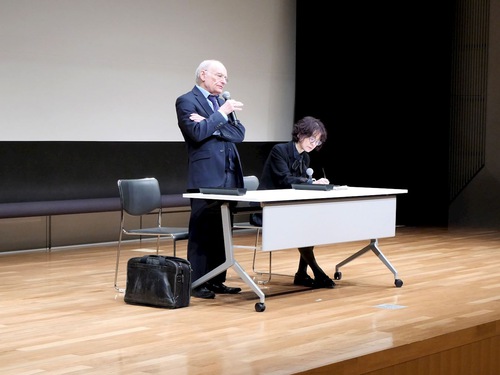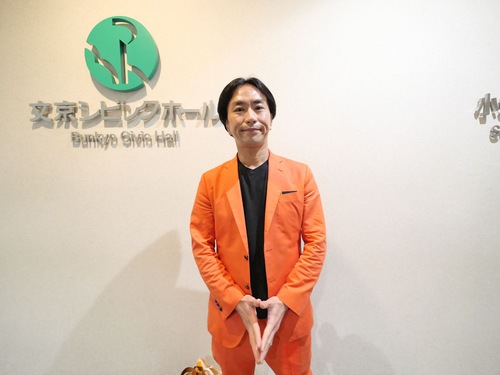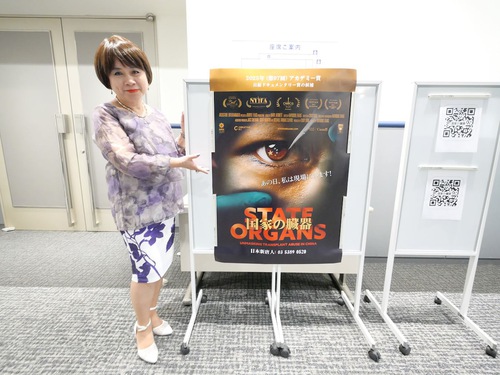(Minghui.org) The documentary State Organs was screened in Tokyo on March 26, 2025. Canadian human rights lawyer David Matas gave a lecture at the event as part of the effort to raise awareness of the Chinese Communist Party’s (CCP) forced organ harvesting of prisoners of conscience. The screening of State Organs aims to expose the human rights violations in China, increase public attention to the issue of forced organ harvesting, and promote cooperation within the international community to help bring an end to the atrocity and protect people’s lives and dignity.
The film took about seven years to produce and documents the CCP’s forced organ harvesting from Falun Gong practitioners, who have been violently persecuted by the CCP since 1999. The film, which includes eyewitness accounts, opens with the shocking testimony of former surgeon Mr. Zheng Zhi, who witnessed the live organ harvesting. In addition, the film features recordings of overseas human rights activists who posed as patients and called Chinese hospitals to inquire about the speed of organ transplants and whether the organs came from Falun Gong practitioners.
The documentary also depicts the pain of the families of missing Falun Gong practitioners: a father tries every means possible to save his son; a brother mentally prepares himself to face the news of his brother’s death. The audience was deeply moved by these stories.
State Organs director Zhang Yongjin explained that forced organ harvesting is just one facet of the CCP’s genocidal campaign against Falun Gong. He said that as long as the totalitarian regime continues, human rights violations will be covered up and the number of victims will continue to increase.
Human Rights Lawyer David Matas
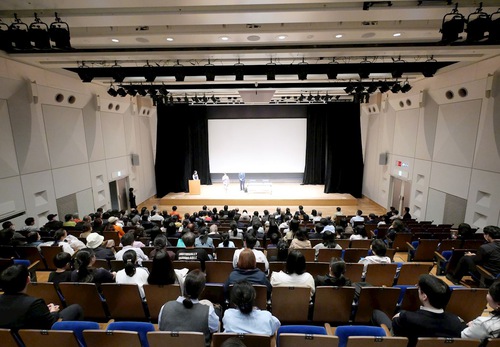 Mr. David Matas addresses the audience at the film screening.
Mr. David Matas addresses the audience at the film screening.
After Mr. Matas’s presentation, some audience members asked what could be done to stop the forced organ harvesting. Mr. Matas responded that medical technology was developed to improve people’s health and living standards, but in China it has been abused and used as a tool for large-scale human rights violations and mass killings. He emphasized that in response to this problem, the medical industry and people from all walks of life have begun to take action.
New legislation has been requested in Japan to ban organ transplant tourism, and many people have contributed by spreading information about the atrocities in China. The film screening emphasized that it is important not to be indifferent to the problem of forced organ harvesting, and everyone should do what they can. It was brought up that it’s crucial that more people pay attention to the issue and take action to promote a resolution to the problem through information dissemination and signature collection campaigns.
The CCP’s forced organ harvesting was first revealed by witnesses who fled China, and investigations were carried based on their testimonies. Several films have been produced to expose these egregious human rights violations. Although there are few witnesses and evidence is difficult to obtain, many people have put forth great effort to make sure that this issue is not forgotten.
During the film and ensuing discussion, it was made clear that the issue of forced organ harvesting in China is an organized crime in which the state participates, targeting prisoners of conscience—mainly Falun Gong practitioners. The international community has expressed serious concern about what is happening in China.
The testimonies of Falun Gong practitioners play an important role in exposing forced organ harvesting. The testimonies indicate that Falun Gong practitioners underwent blood tests in prison, and many practitioners have simply disappeared. This organ transplant compatibility testing is ongoing, and Falun Gong practitioners’ biodata is included in a massive databank. Those who are selected as organ donors are killed as part of the process of organ transplantation.
Former Member of House of Representatives: Justice Will Prevail
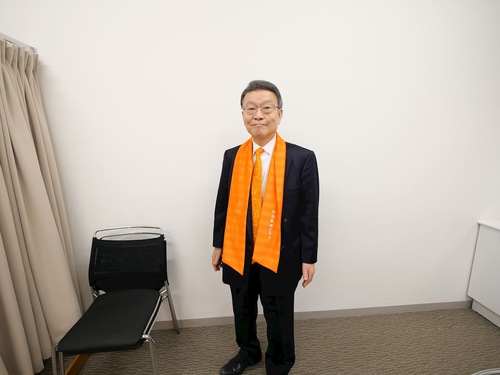 Hirosato Nakatugawa, former member of the House of Representatives
Hirosato Nakatugawa, former member of the House of Representatives
For many years, the issue of forced organ harvesting in China was unknown in Japan. Former member of the House of Representatives, Mr. Hirosato Nakatsugawa has been working on this issue for 20 years and was the first person to take action in the Japanese Parliament. He worked with David Kilgour, former Canadian MP, and human rights lawyer David Matas to continue the investigations and information dissemination.
Due to Japan’s economic relationship with China, it’s very difficult to discuss the issue of forced organ harvesting publicly, and the media seldom reports on it. However, in recent years, Japan’s Sankei Shimbun newspaper and certain TV programs began paying attention to this issue, so the public is becoming increasingly aware of the situation.
Mr. Nakatsugawa called on the people of Shibuya and Yokohama to pay attention to the seriousness of the issue of forced organ harvesting. He warned that children’s organs may also be harvested in China, and this problem may become more serious in the future.
Mr. Nakatsugawa appealed to the Japanese government, calling for the adoption of a resolution criticizing China, and the enactment of a law to protect Falun Gong practitioners. He firmly believes that justice will prevail and said he will continue to work hard to solve the problem of forced organ harvesting.
Support for Ending Forced Organ Harvesting
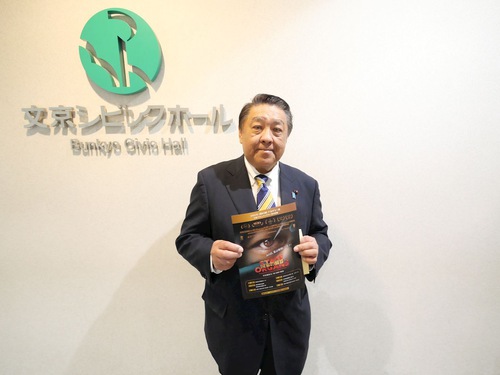 Fumitaka Nihei, Koto District Council Member
Fumitaka Nihei, Koto District Council Member
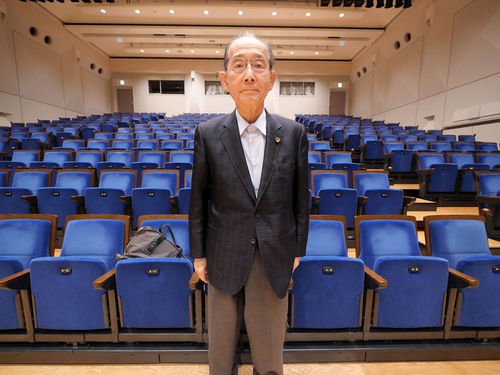 Yoshiaki Harada, former Minister of the Environment
Yoshiaki Harada, former Minister of the Environment
Japanese officials present at the screening expressed support for ending the organ harvesting crimes in China.
After watching the film, Mr. Yoshiaki Harada, former Minister of the Environment, expressed his understanding of the difficulties encountered in making such a film. He said, “After watching the film, I really think everyone did a great job. Japanese people didn’t know much about this before.”
Film Director Commends the Documentary
Film director Shun Coney praised the excellence and social significance of the documentary. He said, “The documentary is based on years of investigation. It directly presents the distressing theme of forced organ harvesting in China. It is an outstanding work. It is very brave to pursue the truth hidden in the darkness of China and convey the pain of those who cannot speak out.
“This film teaches us the importance of speaking out in the face of things that are intolerable to humanity and ethics. We must persist in speaking out against this injustice.”
Event Organizer Urges the Chinese Government to Respect Human Rights
Event organizer Ms. Suda said, “Organ transplantation requires a high degree of moral and ethical considerations. In particular, from the perspective of medical ethics, the dignity and rights of organ donors must be respected to the greatest extent. However, the Chinese government seems to regard the bodies of its citizens as state property and believes that organs are also state property. This is a complete disregard for the human rights of its citizens and is absolutely intolerable. We must deeply understand this issue, and strongly urge the Chinese government to respect the human rights of its citizens.”
Copyright © 1999-2025 Minghui.org. All rights reserved.
Category: Organ Harvesting



